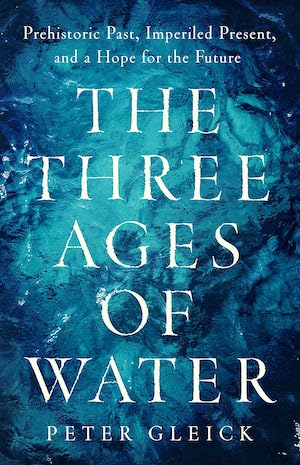By David L. Kirchman
Shortlisted for the 2024 ΦBK Award in Science
Our physiological requirement for water probably hasn’t changed much since Homo sapiens evolved in Africa a hundred thousand years ago, but that’s likely the only thing that hasn’t changed. The Three Ages of Water is about our evolving relationship with water. In a fascinating mix of history, science, and politics, presented in limpid prose, Peter Gleick tells us how past civilizations used, regulated, fought over, and attempted to control water; and he describes alarming trends of today, from deep wells running dry to droughts and floods brought on by climate change. Being an optimist, he ends with a hopeful prescription for the future.
The First Age started when water appeared on Earth nearly 4.5 billion years ago, delivered by a comet according to one hypothesis. The Age began in earnest when “intentional” agriculture and irrigation were invented about 10,000 years ago. (Today agriculture accounts for about 80 percent of all water consumption.) Kings were made and empires built on their capacity to secure and maintain water supplies. As the need for agriculture and irrigation grew, so too did conflicts. Gleick writes that the first war over water occurred around 2500 BCE in the floodplains of the Tigris and Euphrates rivers. It wasn’t the last war. Later in the book, he claims that although “shared water resources have more often been a source of cooperation, negotiation, and agreement,” he presents data showing that the number of water-related conflicts increased more than a hundred times from 1980 to 2021.
Gleick doesn’t give a year to mark the start of the Second Age, our Age, explaining the transition took centuries. It certainly had arrived by the 19th century when science was emerging from natural philosophy, the human population had started to explode, and pollution was upending people’s lives. The River Thames is a case in point. By the early 1800s, London was home to millions who used the Thames as both a sewer and a source of water. The miasma wafting from the river was thought to be not only malodorous but lethal; cholera had killed tens of thousands in waves of worldwide pandemics. Before Robert Koch found the true cause of cholera (a bacterium) in 1884, civil engineers devised treatment plants and water intake systems to supply safe drinking water to Londoners. Worldwide, civil engineering has saved more lives than modern medicine has. Even after those advances, Gleick writes, the lack of safe water and adequate sanitation still kills about 2 million people a year.
The problem of securing safe drinking water was solved in developed countries by government-funded research and public works, yet two trends didn’t follow that success story. Though water has been long assumed to be a public good, some municipalities have sold their water systems to private companies, which were thought to be more efficient and better than a government-run entity. Gleick argues that privatization has not worked; private waterworks are less transparent and can be more expensive, returning money to shareholders rather than reinvesting in the community. There has also been a tremendous rise in the consumption of bottled water. Water from a plastic bottle may be the only alternative in some situations, but those are rare. After being disparaged by Fiji Water, the city of Cleveland showed that its tap water had lower levels of arsenic.
The Second Age is coming to an end, according to Gleick, as water demand exceeds supply, and the cost of withholding water from rivers, wetlands, and lakes becomes prohibitive. We need a Third Age. Rather than the “hard path,” lined with dams, aqueducts, and other physical infrastructure built during the Second Age, Gleick argues that in the Third Age we should focus on a “soft path.” It starts with recognizing that we have a basic right to safe water and sanitation and with acknowledging water’s true value; it’s not just another money-making commodity. (Gleick describes his extensive work in other countries, including a trip to South Africa in 1996 to advise Nelson Mandela’s new government about water rights and managing water resources.) Gleick outlines ways to reduce water use and to recycle water that otherwise would be lost, and he imagines a future where everyone has access to clean water, ecosystems desiccated by our water overuse are restored, and conflict over water is subdued. Although the Age may seem too bucolic to be realistic, it is firmly grounded, attainable, and appealing. It may be our best hope for a sustainable future.
David L. Kirchman (ΦBK, Lawrence University) is a professor emeritus at the University of Delaware and a resident member of the Alpha of Delaware chapter of Phi Beta Kappa.




